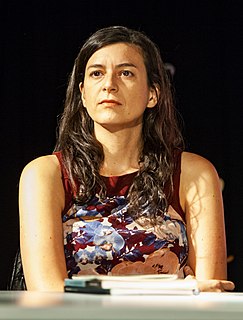A Quote by Michael Connelly
I think there has to be an empathic strike between the reader and the protagonist. There has to be something said or known that connects the reader to this person you're going to ride through the story with.
Related Quotes
First person allows deeper insight into the protagonist's character. It allows the reader to identify more fully with the protagonist and to share her world quite intimately. So it suits a story focused on one character's personal journey. However, first person shuts out insights into other characters.
As a reader, when the writer gets sentimental, you drift, because there's something fishy going on there. You recognize a moment that's largely about the writer and the writer's own need to believe in something that might not in fact exist. As a reader, you think, 'Where did the story go? Where did the person I'm reading about go?'
We must be forewarned that only rarely does a text easily lend itself to the reader's curiosity... the reading of a text is a transaction between the reader and the text, which mediates the encounter between the reader and writer. It is a composition between the reader and the writer in which the reader "rewrites" the text making a determined effort not to betray the author's spirit.
In my couple of books, including Going Clear, the book about Scientology, I thought it seemed appropriate at the end of the book to help the reader frame things. Because we've gone through the history, and there's likely conflictual feelings in the reader's mind. The reader may not agree with me, but I don't try to influence the reader's judgment. I know everybody who picks this book up already has a decided opinion. But my goal is to open the reader's mind a little bit to alternative narratives.
For me, even in the most subtle and introspective story, it's all about tension: this is the thread that ties a reader to story, something in the rhythm and in the argument that hypnotizes and pushes us to read with great attention. As a reader, I love the storytellers who play with this, and as a writer it is something I always look for.
I think of myself primarily as a reader, then also a writer, but that's more or less irrelevant. I think I'm a good reader, I'm a good reader in many languages, especially in English, since poetry came to me through the English language, initially through my father's love of Swinburn, of Tennyson, and also of Keats, Shelley and so on - not through my native tongue, not through Spanish. It came to me as a kind of spell. I didn't understand it, but I felt it.
For me, one of the reasons I love this form - the personal essay form - is because it's a way of forming an intimacy with the reader. What I'm saying to the reader is: I'm going to tell you something; I'm going to be generous; I'm going to offer. The confession, on the other hand, is sort of an imposition because you're asking the reader to forgive you or somehow exonerate you or say, "Hey, I'm even worse." But what I'm interested in doing is being generous and offering a perspective or suggesting a way of thinking about something.


































